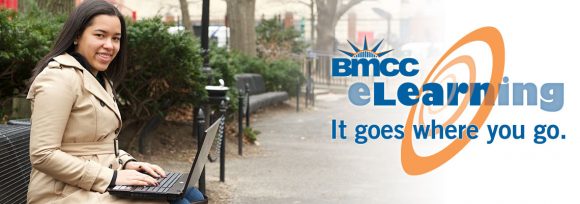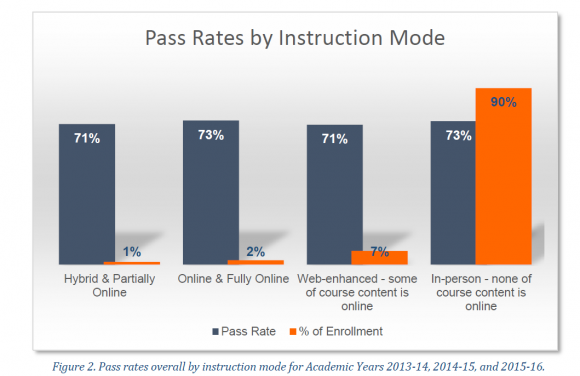Did you know that Blackboard turned twenty? It’s true, and they recently released a white paper on the future of higher education. “Future Forward” says that online learning is the most important thing to happen in higher education in the last twenty years. Not surprising, really, considering.
Here at Borough of Manhattan Community College, we have three major goals for online learning: 1) improve student success, 2) increase access, and 3) create a faculty community of practice. [See the strategic plan here.] I’ll write more about the second two, but first I want to talk a bit about our online students and their success.
In Spring 2017, we analyzed demographic data of students taking online courses. We also sent a brief survey to students enrolled in online classes. 324 students replied. This was the first time we tried to get any information from our online students.

A little over half of them said that they were taking an online course for the first time. The vast majority (94%) said they had “consistent access to internet service at home,” and 34% said they used computers on campus to do coursework for online classes. Over three-quarters of those who were not graduating or transferring said they planned to take more online courses at BMCC. (Note: we did not ask how well they liked their classes or how well they thought they were doing.) Only 15% of the respondents said they were taking any classes anywhere else.
It turns out that online students are a lot like students who take face to face classes at BMCC. However, they are somewhat older and more of them have sophomore standing. About 72% of them are women compared to 57% of the student body overall.
There are a few reasons for these differences, we suspect. BMCC had, until January 2017, a policy that only students with a 2.0 GPA or higher could take online classes. This policy was not enforced in any systematic way, but it tended to keep first semester students out, as they did not have a GPA. Also, some departments offer more upper level courses than they do lower level courses, this is true for accounting and psychology, for example. Those factors may account for the relatively older online student population.
Other research tells us that students who take online courses may do so for the flexibility that they offer. Many community college students have characteristics that suggest that flexibility is important to them. Many students have dependents or may be single parents. Those factors may help explain why more online students are women.
Students who take online courses fall into the same top three majors as the rest of BMCC students: Liberal arts, business, and criminal justice. Very few of our students are taking courses online only, and 70% of the students taking online courses are fulltime students at BMCC. So basically, the students we see in the classrooms are the same students we interact with in the Blackboard space.
So, how well do our students do in their online courses? BMCC colleagues Katherine Conway, Claire Wladis, and Elise Hachey have been looking at online education at the college and in CUNY. They report “that there is no meaningful difference online versus face-to-face in the proportion of students who successfully complete a course with a C- or better, once the specific course taken and student characteristics are controlled. … Students in online courses actually had higher successful completion rates before these other factors were controlled.” (Wladis, Hachey & Conway, 2016).
Overall, our internal data show that pass rates in online and hybrid courses are about the same as they are in face to face courses. They range between 65% and 70%, from 2007 to 2015. The pass rates by instructional mode in academic years 2014, 2015, and 2016, were all between 71% and 73% as shown below. (Office of Institutional Research and Analytics)

Students succeed at nearly the same rates online and face to face at BMCC.
These are things we know. And they are a starting point for a discussion about how we can help our students to succeed in online courses. The staff in our E-Learning Office works hard every semester to help students log in to their courses and provide technical and to encourage new online students to complete a Blackboard orientation module. We will also be implementing a number of recommendations from a task force on student success that met last spring, including a new early alert system and expanded academic supports for online students.
Online learning is an important element of modern higher education. Leaders interviewd for the Blackboard white paper agree that it will continue to transform higher education in the United States. BMCC is committed to offering quality online courses with the supports students need to be successful.
References
“E-Learning Success Update.” (2017a) Office of Institutional Effectiveness and Analytics. Borough of Manhattan Community College. [Office web site.]
“E-Learning Student Profile Fall Terms 2013-2016.” (2017b). Office of Institutional Effectiveness and Analytics. Borough of Manhattan Community College.
Wladis, C., Hachey, A.C. & Conway, K.M. (2016). Who Succeeds Online? Using Student Characteristics to Predict Online Versus Face-to-Face Attrition, NSF Envisioning the Future of Undergraduate STEM Education Symposium, April, 2016, Washington, D.C. [See more about the online learning research project here.]


